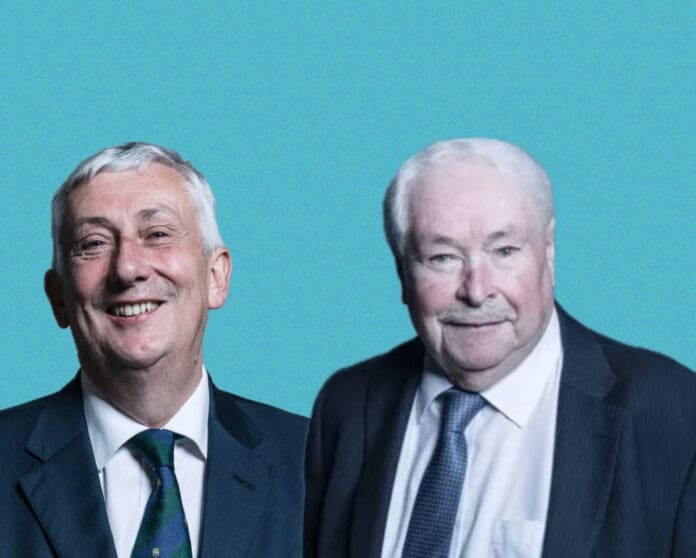Lindsay Hoyle MP, Speaker of the Commons:
— Howard Beckett (@BeckettUnite) August 5, 2025
•Blocked an SNP motion to end slaughter in Gaza 🇵🇸 & ban 🇬🇧 arms sales to 🇮🇱
•Now he won’t release emails of his ‘solidarity’ visit to 🇮🇱 in Nov ‘23
His father co-founded ‘Labour Friends of 🇮🇱’
Is he fit for office?
You say. pic.twitter.com/2L5DsQX2TO
Sir Lindsay Hoyle, the Speaker of the House of Commons, is bound by the conventions of political neutrality that come with his role. Yet his family’s longstanding ties to Zionism and the pro-Israel lobby in Britain have frequently drawn attention, particularly the influence of his late father, Doug Hoyle, a Labour MP and peer who was a key figure in the establishment of Labour Friends of Israel (LFI). These connections have shaped not only the Labour Party’s historical stance on Israel but also continue to influence debates over British policy in the Middle East.
Doug Hoyle, who served as MP for Warrington before being elevated to the House of Lords, played a central role in the formation of Labour Friends of Israel in the late 1950s. The group was founded to consolidate support for Israel within the Labour Party, promoting close military, economic, and diplomatic ties between the UK and the Israeli state. A committed Zionist, Doug Hoyle ensured that pro-Israel sentiment remained a dominant force in Labour’s foreign policy outlook, embedding a stance that has endured through successive generations of the party. His influence extended beyond his own political career, with LFI growing into one of Westminster’s most powerful lobbying groups.
Lindsay Hoyle, elected as MP for Chorley in 1997, inherited these political and ideological connections. Before becoming Speaker in 2019, his voting record reflected a clear alignment with LFI’s objectives. He consistently opposed motions critical of Israeli government actions, including during military offensives in Gaza, and resisted efforts to recognise Palestinian statehood. In 2014, he was among the minority of Labour MPs who voted against a symbolic parliamentary motion to recognise Palestine, a position that placed him at odds with much of his own party and broader international opinion.
Crooks like Lyndsey Hoyle should be sat in the dock at the Hague, not in the speakers chair at the House of Commons. #LabourOut pic.twitter.com/DjnWrTNHdU
— Justintime (@tykestakeonit) August 4, 2025
Since assuming the speakership, Hoyle has been expected to distance himself from factional politics, but controversies have persisted. In 2020, he faced allegations of interference after reports emerged that he had blocked a proposed debate on UK arms sales to Israel, claims he denied, though critics pointed to his history of pro-Israel advocacy. More dramatically, in February 2024, he triggered a constitutional row by departing from parliamentary precedent to allow a vote on an amended Gaza ceasefire motion. While he defended the move as ensuring broader debate, many interpreted it as an attempt to shield Labour leader Keir Starmer from a damaging backbench rebellion. Pro-Palestine campaigners accused Hoyle of bias, arguing that his family’s deep-rooted links to Zionist lobbying had compromised his impartiality.
The role of Labour Friends of Israel remains pivotal in this context. Co-founded by Doug Hoyle, the organisation continues to exert considerable influence, organising delegation trips for MPs to Israel and lobbying against Palestinian solidarity campaigns, including the Boycott, Divestment and Sanctions (BDS) movement. Critics contend that LFI’s sway has contributed to the stifling of meaningful parliamentary discussion on Palestinian rights, with Hoyle’s speakership occasionally appearing to align with these pressures.
Though Hoyle insists on his neutrality, his political lineage and past affiliations inevitably raise questions. As British politics wrestles with the moral and strategic dilemmas of the Israeli genocide in Gaza, the Speaker’s personal history, interwoven with one of Westminster’s most enduring lobbying forces, ensures his decisions remain under close examination. Whether familial and ideological ties to Zionism still shape parliamentary discourse is a matter of debate, but for many, the legacy of Doug Hoyle’s activism remains an inescapable dimension of his son’s tenure in one of British democracy’s highest offices.
It gets murkier and murkier.







